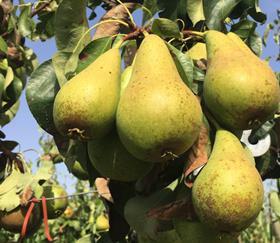
Following last year's massive pear crop in Belgium, a decline in production this season was always on the cards. Forecasts delivered at the Prognosfruit conference confirmed that expectation, predicting a drop in Belgian pear production of 25 per cent to 295,000 tonnes, 19 per cent below the three-year average.
However, this decrease was put into perspective by the declines anticipated from other large European producers, including Italy, where volumes are forecast to fall by 65 per cent year-on-year, and France (57 per cent). Could this season actually prove to be an opportunity for Belgian pears?
'Every season has its opportunities and challenges,' answers Marc Evrard, commercial director at Belgium's largest pear exporter, BFV, 'and this one is no different.
'What we’ve noticed in the last few years is a number of the challenges that growers in southern Europe have had to contend with, especially concerning the climate and logistics, are getting harder to manage.
'So there are opportunities for us, but also more responsibility on our shoulders. Year after year, more and more consumers rely on us to provide them with good quality, tasty pears.'
Conference growth in Germany
Laurent De Smedt, head of the topfruit division at the BelOrta cooperative, says the decline in Abate Fetel volumes from Italy means greater opportunities for Conference pears in Europe, including further growth in the German market.
'If we look at the amount of pears we sell to German retailers, it is huge,' says De Smedt, 'and that was non-existent ten years ago. We usually sell smaller sized pears there. But this year, we have requests for larger sizes to replace the Abate Fetel. This season we are looking at the German and French markets, perhaps also Italy.'
'Due to a bit less competition and the fabulous taste and great shelf-life of the fruit, we have an opportunity to increase our share of the market in Germany,' Evrard concurs. 'Because we are nearby, we can react very swiftly to orders. We see a firm commitment in the Conference pear from our clients. Our customers now want pears all year round, and they have high expectations.'
The recent growth of the Conference in Germany has in part been down to excellent planning, says Evrard. 'We were encouraged by our success in introducing the Conference to consumers in China,' he reveals. 'It was new for us to introduce the pear to brand-new markets. It gave us a strategy to also develop the market potential closer to home.
'We and our Dutch colleagues focused on a strategy to organise nationwide tastings. It’s great to see this strategy paying off. You need a goal, you need to set out a strategy, and it takes hard work and teamwork, but you also need a bit of luck. Unfortunately, our Italian colleagues have encountered a series of misfortunes, which has boosted our own opportunities.'
Making the right investments
The Belgian cooperatives are also investing in club varieties, BFV in Sweet Sensation, BelOrta in Fred. 'This is an important part of our diversification strategy,' says Evrard. 'If one variety proves less successful in one market, there are alternatives.'
'The blushed variety Fred suffered less than some others during the spring frost,' reveals De Smedt, 'so this is an important consideration. Fred could be a key variety.'
'We need to find varieties that are more adapted to the changing climate,' says Evrard. 'Recently we have seen snow in southern Brazil, flooding all over Europe and heatwaves in many regions. Last year we didn’t have enough rain; this year, some of our growers had their orchards flooded. More and more growers are investing in nets to protect from hail. We support them with joint hail insurance, which we organised with colleagues in the industry.'
'Many growers are deciding not to expand production, but instead to invest in crop protection,' adds De Smedt. 'They see that the Conference is a good pear, but that there is enough on the market, so old orchards are being replaced with new varieties with hail protection or with younger Conference trees.'
And when it comes to packaging, BelOrta is also looking for the most sustainable option. 'Cardboard is currently seen by the public as green, but the reality is that a single plastic wrap that can be easily recycled is an equal alternative,' states De Smedt. 'Studies are being completed in a Belgian university to test the overall impact on the environment. Then we will need to convince our customers.'



